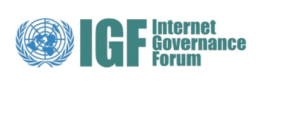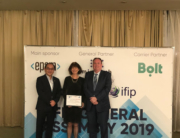 IFIP partnered with the Internet Governance Forum (IGF) on a panel session for its 92nd Town Hall meeting held on 30th November 2022 in Addis Ababa, Ethiopia.
IFIP partnered with the Internet Governance Forum (IGF) on a panel session for its 92nd Town Hall meeting held on 30th November 2022 in Addis Ababa, Ethiopia.
IFIP President Anthony Wong introduced and moderated the panel session, which explored issues relating to “Ethics and Regulation of Emerging Technologies and Artificial Intelligence”. The panel comprised Mr Wong, Shamika Sirimanne, Director of UNCTAD’s Division on Technology & Logistics and Head of the secretariat to the United Nations Commission on Science and Technology for Development (CSTD), and Professor Edward Santow, former Human Rights Commissioner of Australia and Co-Director of the Human Technology Institute, UTS.
Ms Sirimanne reflected on the impact of frontier technologies and how all countries do not participate equally in defining their path. Associated with that was the gender bias which often favours males. She advocated for a global dialogue on the governance and ethics of these technologies.
Ms Sirimanne said that with the economic incentives of AI and related technologies being a USD$3.2 trillion market by 2025, efforts need to be made to ensure that the competitive landscape of this digital transformation remains ethical. To date, data sets mostly fail to include the diversity of peoples from poorer countries, which may lead to biases. It is not ethical to allow such developments when the biases affect most of the world population. There is a need for a comprehensive framework that is normative and international. She proposed that open AI innovation developments will facilitate involvement from international participants, which is more amenable for an equitable approach to AI development. To help ensure such developments, there is a need for inclusive governance that gives voices to the underdeveloped countries. That requires the involvement of the UN. Recommendations such as the UNESCO Recommendation on the Ethics of Artificial Intelligence, the very first global standard-setting instrument on the subject (2021), are beginning to address this, but regulation is not keeping pace with the rapid developments of emerging technologies.
In his comments, Professor Santow emphasised that the primary duty of states and the international community is to ensure compliance with international human rights law in the development and use of AI. The proper role of AI ethics frameworks is to provide guidance where the law is silent or unclear.
He referred to his work as Australia’s Human Rights Commissioner, when he led a major project on the human rights and broader social implications of AI. That three-year project was the most extensive public consultation anywhere in the world on what the rise of AI means for communities. On the one hand, people can see how AI and other emerging technologies could make their lives better, such as through improvements in communication or precision medicine. On the other hand, people are increasingly becoming aware of the risks and threats of harm associated with AI. People also voiced scepticism about the discourse on AI and ethics. The notion that companies and governments should look primarily to their own ethical principles to address legitimate concerns about equality, privacy and other human rights violations seemed too often like an excuse for inaction. Globally, over 500 AI ethics frameworks or sets of AI ethics principles have been developed over the last five years. Ethical principles clearly abound, but adequate governance does not.
Professor Santow claimed that international and domestic human rights law is applicable and well-adapted to the development and use of AI. The main challenge has been a failure to apply or enforce those laws rigorously, effectively and consistently. Governments and companies need to pay greater heed to their legal and especially human rights and obligations. Those essentially boil down to three key principles: AI should be fair, accurate and accountable.
Like Ms Sirimanne, Professor Santow expressed concern that the availability, and especially the benefits, of AI are not being evenly distributed across the global community. While Ms Sirimanne explored this phenomenon from a developing country perspective, Professor Santow pointed out that even in a wealthy country like Australia, one’s socio-economic status is important in determining one’s experience of recent technology.
The panel session ended with questions from the audience and the moderator, Mr Wong. This led to reflections on practical steps which could ensure that ethical commitments on AI drive real change. Ethical principles alone appear to yield little or no significant change. But there is a useful role for ethics in filling the gaps where the law is silent or unclear. However, in those situations the focus should not just rest on high-level principles but instead on turning these principles into practical action.
Another challenge identified by the Panel discussion is a need for a robust definition of AI to enforce legal compliance. Regulation is hampered by the rapid development of AI and other emerging technologies.
The panellists were particularly concerned to highlight that vulnerable people in underdeveloped countries frequently bear the brunt of early experiments with emerging technology. This could be seen as a new form of ethical dumping, which is where practices that would not be acceptable in a developed country are used in lower-income settings. International law needs to be applied rigorously because in many instances it can already address emerging AI technology challenges. In a sense, AI is about doing what has been done before in new ways. Therefore, the normative framework (legal requirements) for doing things still applies. Evening out, the digital divide needs to genuinely involve people from most of the world.
Mr Wong concluded that countries are at different levels of AI ecosystem maturity. Emerging technologies interact, merge and interconnect creating new and complex issues, and ethical, legal, and regulatory challenges on many fronts. Regulatory systems need to consider a broad range of contexts including human rights, safety and liability issues, data protection and privacy issues, deceptive and unfair business practices, contracts, future of employment, data ownership and control and intellectual property – as different AI applications create and pose different benefits, level of risks and issues. Regulation is currently in its infancy, fragmented and evolving globally, but we are likely to see more AI laws and regulations in the future, as we have seen many situations where the ‘horse has bolted’ – beyond AI Ethics washing.
As a global non-profit federation of ICT professional societies, IFIP stands ready to assist humanity and the UN with its mission to achieve the worldwide professional and socially responsible development and application of ICTs. IFIP looks forward to continue working with the UN, including UNCTAD and the United Nations Commission on Science and Technology for Development, on the SDGs and on the applications, benefits and governance of emerging technologies including AI, as well as on how to mitigate related challengers and risks.





